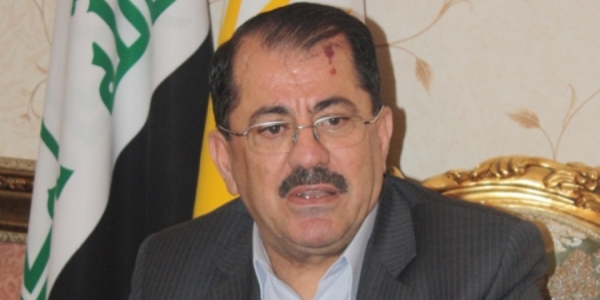By MOHAMMED HUSSEIN of Error! Hyperlink reference not valid. Published Friday, March 1st, 2019 SULAIMANIYA - The Trump administration's decision to re-impose sanctions on Iran has forced the Kurdistan region - like the rest of Iraq - into a difficult balancing act. The U.S. government has provided the Kurdistan Regional Government (KRG) with essential military and financial support; yet as a neighboring country, Iran has built long-term economic, security, and political ties that cannot be quickly or easily altered. One case in point came on Feb. 14, when the KRG Ministry of Natural Resources (MNR) - under U.S. pressure - issued an order banning all exports of crude and fuel to Iran. A week later, the MNR issued a follow-up directive that clarified the earlier order was only meant to stop illicit smuggling; licensed refiners and permit holders could once again send trucks through KRG crossing points into Iran. Nazm Dabakh is the KRG's representative in Iran. (As an autonomous region, the KRG does not have a formal diplomatic presence in Tehran, but Dabakh essentially functions as an official emissary.) He spoke with Iraq Oil Report by phone about the state of Iran-KRG relations, the see-sawing orders from the MNR, and the challenges of diplomacy with Iran in the era of renewed U.S. sanctions.
Mohammed Hussein: How do you see trade relations between the Iraqi Kurdistan region and Iran?
Nazm Dabakh: I think the current trade relations between Iraqi Kurdistan and Iran are fragile, weak, and unstable. Trade activities need guarantees, security, and normal exchange of money. Currently, none of these conditions exist.
MH: The volume of trade in both directions seems to be increasing. Why do you say the relations aren't stable?
ND: Traders on both sides have a hard time exchanging money to U.S. dollars. They are suffering with very volatile money exchange rates. They also have issues transferring money. All these factors made their market unstable. However, trade and economic relations between Kurdistan and the Islamic Republic of Iran are still ongoing. We have always tried to get the Kurdistan region to organize its relations with Iran within the framework of the Iraqi federal government.
MH: Do you mean the Kurdistan region can’t have any special relations or commercial exchange with Iran, apart of what Baghdad has?
ND: Yes, Kurdistan’s relations have always been treated as part of the relations between Iraq and Iran. We are totally committed to Iraq’s foreign relation policy. It also complies with the agreements between Erbil and Baghdad. It is part of the bigger agreements Erbil and Baghdad have reached to put border crossings back under the control of thefederal government.
MH: Sometimes the KRG's decisions are not stable regarding trade relations with Iran. Just this month, Kurdistan halted all oil exports to Iran, and then a week later issued another clarifying that all the refineries and companies that have proper permits are exempt from the export ban.
ND: I do not see it as instability in Kurdistan’s trade policy. In the first place, when the order of the export ban was issued, I said it was a temporary decision, and would not last for a long time. If Iraq does not stop its oil exports to Iran, why would we stop it? [Editor's note: The federal Oil Ministry says it stopped all export trucking to Iran before U.S. sanctions snapped back into effect in November 2018.]
MH: If Erbil organizes its relations based on Iraq’s foreign trade relations with Iran - and if Iraq has no such ban, as you say - why would Erbil ban the oil exports in the first place?
ND: The Kurdistan Regional Government has its own reason to ban the oil exports. It basically wanted to prevent oil smuggling.
If you look at the second order, it clearly allows [exports from] all the refineries and companies that have work permits in Iraq and Kurdistan. Therefore, I can say that the export ban was as an effort to prevent oil smuggling.
MH: Do you think the second order, to exempt permitted refineries and companies from the export ban, was issued because of diplomatic contact between Kurdistan and Iran?
ND: No. I think it was purely based on Kurdistan’s interests. Why would you ban oil exports to Iran while the same exports are ongoing from all other places to Iran? Why should Kurdistan alone undermine its interests and trade relations? Meanwhile, preventing oil smuggling is also in favor of Kurdistan. So, I can say the both orders were issued based on Kurdistan’s interests, not anything else.
MH: You said that one reason behind the MNR's Feb. 14 order to ban exports was an effort to prevent smuggling. Are Iranian officials also concerned about smuggling? If so, what actions are being taken or proposed within Iran to combat this?
ND: I can talk only about the Kurdistan government's position, which is clearly against smuggling. The order to ban oil exports was aimed at preventing the trade of any smuggled oil.
https://www.iraqoilreport.com/news/qa-nazm-dabakh-krg-representative-to-iran-37587/

